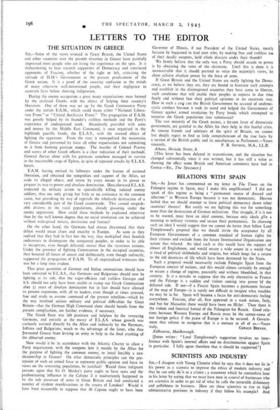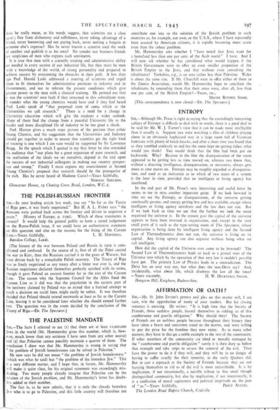SCIENTISTS AND INDUSTRY
SIR,--I disagree with Young Chemist when he says that it does not lie in his power as a scientist to improve the ethics of modern industry and that he can only do itas a citizen ; a statement which he contradicts later in his letter by saying that we must have men in control of businesses who are scientists in order to get rid of what he calls the miserable dishonesty and offishness in business. How are these scientists to rise to high administrative positions in industry if they follow his example? And
does he really mean, as his words suggest, that scientists are a class apart ; free from dishonesty and selfishness, never taking advantage of a friend, never borrowing and not paying back, never seeking a bargain at someone else's expense? Has he never known a scientist steal the work of another and publish it as his own? No wonder our business friends are suspicious of men who express such sentiments.
It is true that men with a scientific training and administrative ability are needed in every section of our industrial life, but they must be men with a knowledge of the world, of strong personality and prepared to achieve success by overcoming the obstacles in their path. A few days ago Prof. Harold Laski addressed a meeting of scientists and urged them to fit themselves for administrative positions in industry and in Government, and not to tolerate the present conditions which give greater power to the men with a classical training. He pointed out that II was the scientists' own fault if they remained in this subordinate state. I wonder what the young chemists would have said if they had heard Prof. Laski speak of "that perpetual state of coma which at the
Universities we call research." There is a need for a change in University education which will gite the students a wider outlook. Many of them find the change from a peaceful University life to the harder and more disciplined life of industry to be too great a shock.
Prof. Hutton gives a much truer picture of the position than either Young Chemist, and his suggestion that the Universities and Industry should get together in order to ensure that scientists get the right kind of training is one which I am sure would be supported by Sir Lawrence Bragg. In the speech which I quoted in my first letter he also reminded his audience that "our plans for a great expansion of pure research, and the realisation of the ideals we set ourselves, depend in the end upon the success of our industrial colleagues in making our country prosper- ous and strong." Finally I must express my astonishment at Second Young Chemist's proposal that research should be the prerogative of the rich. Has he never heard of Madame Curie?—Youts faithfully,
NORMAN SHELDON.
Gloucester House, 19 Charing Cross Road, London, W.C. 2.



























 Previous page
Previous page